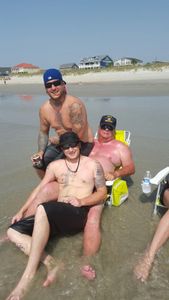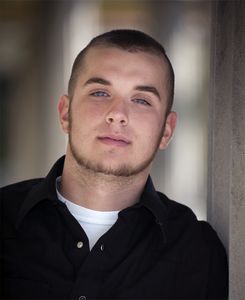Mario Circo
 Mario Circo, a beloved firefighter, is remembered for his kindness, intelligence, and wit. During his life, he experienced symptoms consistent with the early stages of suspected CTE. His family attributes these symptoms to concussions he received during high school football along with the impact of his firefighting career and wanted to share his story in hopes of helping others who may be suffering. We thank the Circo family for their willingness to share Mario’s story with us.
Mario Circo, a beloved firefighter, is remembered for his kindness, intelligence, and wit. During his life, he experienced symptoms consistent with the early stages of suspected CTE. His family attributes these symptoms to concussions he received during high school football along with the impact of his firefighting career and wanted to share his story in hopes of helping others who may be suffering. We thank the Circo family for their willingness to share Mario’s story with us.
Read Mario’s story below.
Trigger Warning: this story mentions suicide.
 Mario Circo knew no stranger. He was the fun-loving teammate who kept the team spirit high throughout his youth baseball and football careers and these were traits he took with him during his three years as a firefighter.
Mario Circo knew no stranger. He was the fun-loving teammate who kept the team spirit high throughout his youth baseball and football careers and these were traits he took with him during his three years as a firefighter.
He is remembered as everybody’s friend, the type of friend that would give you the shirt off his back, no questions asked. His Best Man record is a testament to exactly that. His speeches are quite famous among his large group of friends and family.
“I always felt his love,” said his mother, Cindy. She remembers his sense of humor, intelligence, storytelling ability, and his kindness. “He would tell me he was proud of me. That melts a mom’s heart coming from your child.”
 Mario loved the outdoors and Montana was his favorite place to spend time. He loved listening to Chris Stapleton and his favorite pair of cowboy boots. He loved the Kansas City sports teams so fervently he had their logos as tattoos. He loved the Kansas City Chiefs most of all and Cindy remembers him predicting Patrick Mahomes’ success years before it happened.
Mario loved the outdoors and Montana was his favorite place to spend time. He loved listening to Chris Stapleton and his favorite pair of cowboy boots. He loved the Kansas City sports teams so fervently he had their logos as tattoos. He loved the Kansas City Chiefs most of all and Cindy remembers him predicting Patrick Mahomes’ success years before it happened.
His first concussion was a surprise to Cindy. She was unaware of it until a doctor examining him after his second concussion mentioned there was evidence of a prior concussion. Before his senior football season, his parents invested in a concussion helmet, but he sustained the third concussion in practice two days before the season started.
“It changed that kid that year,” Cindy said. “He struggled his whole senior year.”
 At one point, he seemed to be getting better. He had the opportunity to join a program that allowed students that fell behind in high school but showed potential to begin college early in the summer. He went into the program and received extra assistance in the summer to better adjust to college in the fall. Mario eventually came home from the program after one semester. He was disappointed in himself, again Cindy saw it as lingering effects. He began figuring out the next steps. He was interested in joining the military but was advised against it because of his concussion history.
At one point, he seemed to be getting better. He had the opportunity to join a program that allowed students that fell behind in high school but showed potential to begin college early in the summer. He went into the program and received extra assistance in the summer to better adjust to college in the fall. Mario eventually came home from the program after one semester. He was disappointed in himself, again Cindy saw it as lingering effects. He began figuring out the next steps. He was interested in joining the military but was advised against it because of his concussion history.
Ultimately, he followed what several family members did, including his father, and served as a firefighter. Mario graduated from the academy in March 2015 and served proudly as a member of the Kansas City Fire Department. He thought it was honorable to be of service to his community and he had a special bond with the crew he worked with at the station. Looking back there were events during his time as a firefighter that seemed to compound his symptoms.
 Soon after solidifying his career, he bought his own home. It was around this time when additional changes in his personality and demeanor became apparent. When Cindy went to visit her son, she noticed the house was in a state of upheaval. When pointed out, Mario brushed it off, saying he had been busy.
Soon after solidifying his career, he bought his own home. It was around this time when additional changes in his personality and demeanor became apparent. When Cindy went to visit her son, she noticed the house was in a state of upheaval. When pointed out, Mario brushed it off, saying he had been busy.
Cindy helped him to get organized and together they worked on redecorating the house, a project Mario wanted to begin. Later, he told his mother that he was having trouble paying his bills. When she went over to help him, she found that he was making plenty of money, saving appropriately and was overall on track financially. He was just not making the payments. She helped him set up auto payments for his bills.
Shortly after, she noticed projects being left unfinished around the house. Mario stated, “I just can’t finish it.” She voiced her concern that something else might be going on, Mario assured her he was fine. And for the rest of the year, he seemingly was.
 “I even told my mom one day, I said, ‘oh my gosh, Mario is really turning the corner, you know, you start having these conversations about adulthood and just getting out of that, you know, crazy boy age and college kind of age,” Cindy said. “It was about a year from [then] that he called me in again and he’s like ‘I don’t know, something’s going on.
“I even told my mom one day, I said, ‘oh my gosh, Mario is really turning the corner, you know, you start having these conversations about adulthood and just getting out of that, you know, crazy boy age and college kind of age,” Cindy said. “It was about a year from [then] that he called me in again and he’s like ‘I don’t know, something’s going on.
“He knew something was wrong.” He had ringing in his ears and memory loss, among other symptoms.
 Over time his personality had changed too. “This super funny and intelligent person you would be in a conversation with could switch to a defensive, ‘why are you picking on me?’ person,” Cindy remembered.
Over time his personality had changed too. “This super funny and intelligent person you would be in a conversation with could switch to a defensive, ‘why are you picking on me?’ person,” Cindy remembered.
She told him that it’s hard to live life when you feel that badly and together, they began setting up doctor’s appointments for Mario to receive help and seek answers.
About a month after setting up these appointments, he took his own life, completely shocking his family, friends, and those who knew him.

“But that’s what really pushes me to think something was going on with him,” Cindy said. “And we just never got a chance to find out what it was.”
Though Mario lived a short life, it was an impactful one. In the receiving line at his visitation, hundreds attended, and Cindy was moved by the support and stories shared. One young man shared a simple sentiment that summed up Mario’s personality well. When Cindy asked how he knew Mario, he said, “I don’t really know him. Every day in middle school he would wave and say hi to me. That’s why I came.”
Cindy is thankful for Mario’s friends and fellow firefighters; they still call and check in on her. His friends and family, including older brother Dominic, sister-in-law Amber, and their children, still gather to honor him yearly. His cousin started holding a Be Kind walk every spring.
 After Mario’s passing, donations began coming in immediately and his family started a fund with their Community Foundation. In the last few years, they have funded scholarships and donated to organizations that support first responders and other related causes. Now Cindy is hoping to help support CTE research. Brain health research is very important to their family, as she lost her father to Alzheimer’s disease.
After Mario’s passing, donations began coming in immediately and his family started a fund with their Community Foundation. In the last few years, they have funded scholarships and donated to organizations that support first responders and other related causes. Now Cindy is hoping to help support CTE research. Brain health research is very important to their family, as she lost her father to Alzheimer’s disease.
When it comes to CTE, she recognizes the importance of spreading awareness. “They need to know it is real,” she said. “It doesn’t only happen to professional football players and military [members].” Cindy is supportive of our recent efforts to recruit more first responders into our UNITE Brain Bank, so that we can better understand the long-term effects of firefighting on brain health.
 “Maybe if I had more awareness of the long-term effects or potential, down the road, signs to look for.…” she said. “That’s the hard part, right? The concussions were in high school. We’re now [dealing with the symptoms] at twenty-four [years old]. So, it just doesn’t happen overnight.”
“Maybe if I had more awareness of the long-term effects or potential, down the road, signs to look for.…” she said. “That’s the hard part, right? The concussions were in high school. We’re now [dealing with the symptoms] at twenty-four [years old]. So, it just doesn’t happen overnight.”
She also wants others to know there is no shame in getting help.
“Awareness, I think, is the biggest thing,” she said. “I feel that we can make an impact.”
If you or anyone you know is struggling with mental health symptoms and/or considering suicide, please know there is help available. Dial 988 to contact the 988 Suicide and Crisis Lifeline and visit #BeThe1To to learn more about preventing suicide.

If you would like to support the BU CTE Center’s research and help give more families life-changing diagnoses, you can donate here.
If you or a loved one are interested in brain donation, please view our Frequently Asked Questions (FAQs) and brain donation brochures for more information.
This story was written by Amanda V. Cabral at the BU CTE Center. If you are interested in having a donor story written for your loved one, please reach out to her at avcabral@bu.edu.